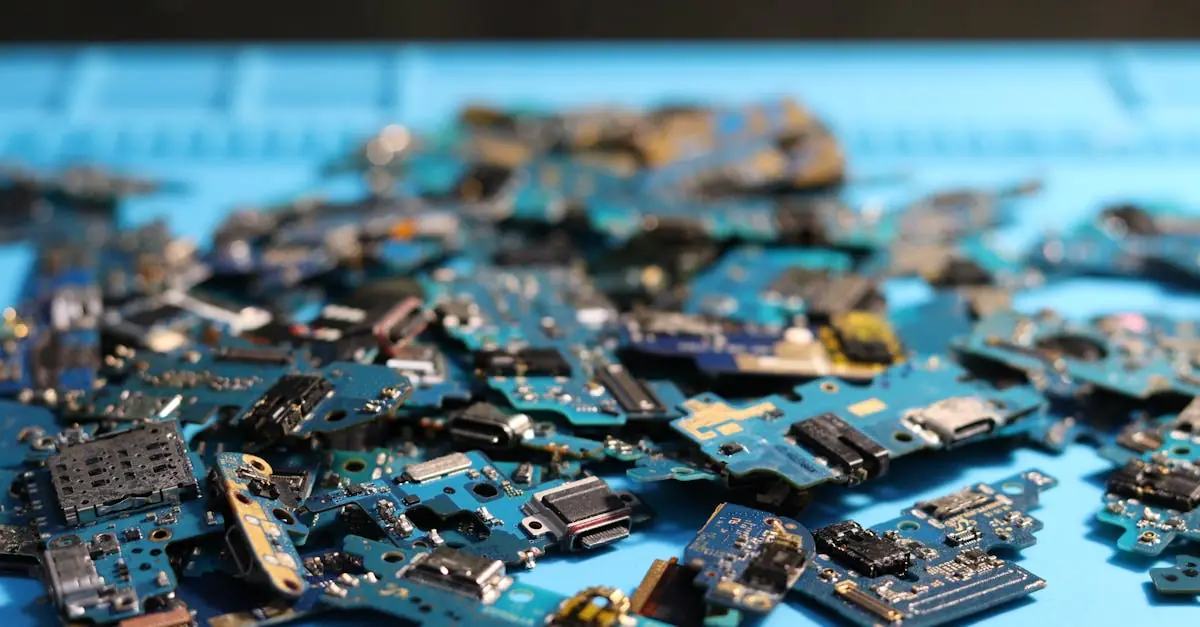Table of Contents
ToggleIn the bustling heart of Washington, D.C., where politics and power intersect, there’s another vital conversation happening—one about electronics recycling. With technology evolving faster than a politician can change their stance, the need for responsible disposal of outdated gadgets is more pressing than ever. Those old phones and laptops aren’t just relics; they’re potential environmental hazards.
Overview Of DC Electronics Recycling
Electronics recycling in Washington, D.C. addresses the significant challenge of managing electronic waste. The city offers various programs that facilitate the safe disposal of outdated devices like smartphones and laptops. Local residents and businesses can participate in initiatives designed to reduce environmental risks.
Programs organized by the D.C. Department of Public Works encourage responsible recycling practices. These initiatives emphasize recovering valuable materials from discarded electronics, such as metals and plastics. Recycling facilities in the area adhere to strict regulations, ensuring proper processing of devices to minimize environmental impact.
Residents can access multiple drop-off locations for recycling electronics, including designated events held several times throughout the year. Moreover, these events provide an opportunity for individuals and organizations to responsibly dispose of their old devices at no cost. Participating in this recycling process not only mitigates harm to the environment but promotes sustainability within the community.
Businesses also benefit from electronics recycling services offered by private companies in D.C. These services often include secure data destruction, helping prevent sensitive information from being compromised during disposal. By establishing partnerships with local recycling centers, businesses can ensure compliance with environmental regulations while supporting responsible recycling efforts.
Ultimately, electronics recycling in D.C. plays a critical role in reducing landfill waste and conserving natural resources. The collaborative efforts between the community, government, and private sectors foster an environment that prioritizes sustainable practices, benefiting both the planet and local residents.
Benefits Of Electronics Recycling
Electronics recycling offers numerous advantages that support both the environment and the economy. Understanding these benefits highlights the importance of responsible e-waste management.
Environmental Impact
Electronics recycling significantly reduces landfill waste. Discarded devices frequently contain harmful substances like lead, mercury, and cadmium, which can leach into soil and waterways. By recycling, valuable materials such as copper, aluminum, and gold get recovered. This process lessens the need for virgin resources and minimizes the environmental footprint associated with extraction and processing. Furthermore, recycling decreases carbon emissions linked to manufacturing new products, fostering a more sustainable ecosystem.
Economic Advantages
Recycling electronics presents notable economic benefits. The process creates jobs in collection, processing, and resale of recovered materials. Increased demand for recycled materials stimulates local economies and encourages innovation in recycling technologies. According to a report from the U.S. Environmental Protection Agency, recycling electronics generates over $40 billion in revenue annually. This financial impact showcases the value of investing in e-waste recycling initiatives while supporting a circular economy that promotes resource efficiency.
How DC Electronics Recycling Works
Electronics recycling in D.C. follows a systematic approach that promotes sustainability and environmental protection. Procedures involve several key stages from collection to processing.
Collection Process
Collection begins at various designated drop-off locations across Washington, D.C. Residents can access these sites year-round during specific collection events. Many initiatives, organized by the D.C. Department of Public Works, facilitate hassle-free recycling. Individuals can also participate in community events that promote awareness about electronics recycling. Conveniently, local businesses offer additional services to assist with large-scale collections. Effective collection strategies reduce the likelihood of e-waste ending up in landfills.
Processing Methods
Processing methods involve several techniques to extract valuable materials from discarded electronics. Dismantling occurs first, where devices are carefully disassembled to recover components. Specific machines facilitate the sorting of materials such as metals, plastics, and glass. Safety protocols ensure that hazardous elements, like lead and mercury, are managed properly. Subsequently, recyclables undergo shredding and refining processes. Ultimately, recovered materials are repurposed to manufacture new products, minimizing resource extraction and supporting a circular economy.
Local DC Electronics Recycling Facilities
Washington, D.C. offers numerous electronics recycling facilities that cater to residents and businesses alike. Locations exist throughout the city, providing free and responsible drop-off options for old devices. The D.C. Department of Public Works operates designated recycling events, ensuring multiple opportunities to dispose of e-waste safely.
Several private companies also provide recycling services, focusing on environmental responsibility. Those companies often include secure data destruction to protect sensitive information. An example of such a facility is the Electronic Recyclers International, which efficiently processes a variety of electronic devices while adhering to strict environmental regulations.
Community centers and local organizations frequently host recycling drives, amplifying accessibility for residents. They partner with recycling firms to facilitate large-scale collections, helping to keep e-waste out of landfills. Understanding facility hours and specific drop-off instructions enables residents to recycle effectively.
In addition to drop-offs, events like the “Bring Your Own E-Waste” days encourage citizens to take part actively. These initiatives promote awareness while providing an opportunity for responsible disposal. Local libraries sometimes serve as collection points, making it convenient for community members to participate.
It’s vital to check each facility’s accepted items list, as requirements may vary. Residents must ensure compliance for a smooth recycling experience. More than 50 million metric tons of e-waste produced globally each year emphasizes the importance of local efforts in reducing environmental impact.
Utilizing D.C.’s electronics recycling resources supports a sustainable community and fosters eco-friendly practices. By participating in local programs, individuals contribute to preserving natural resources and promoting a circular economy.
Tips For Responsible Recycling
Prioritize data security when recycling electronics. Ensure devices undergo secure data destruction before disposal, protecting personal information and company confidentiality. Utilize services from certified recyclers, confirming they adhere to industry standards.
Check local recycling guidelines. Each facility may have specific accepted items and restrictions. Verification helps avoid confusion and ensures compliance with local regulations. Identify nearby drop-off locations from the D.C. Department of Public Works or registered private companies for easy access.
Educate the community. Participating in workshops or events fosters awareness of responsible recycling practices. Sharing information on the environmental benefits of e-waste recycling can motivate others to act.
Participate in recycling events. D.C. hosts numerous recycling drives, often free of charge, offering opportunities to dispose of outdated electronics responsibly. Look for “Bring Your Own E-Waste” days organized by community centers to promote involvement.
Explore donation options. Devices that still function can benefit schools, nonprofits, or community organizations. Donating extends their lifespan while supporting local initiatives.
Follow proper packing protocols. When transporting electronics for recycling, secure items in sturdy containers to prevent damage. It ensures a smooth transfer and protects components during the collection process.
Stay informed about hazardous materials. Understanding which components are harmful aids in the responsible disposal of electronics containing lead, mercury, or other toxic substances. Knowledge significantly reduces environmental risks and promotes safer recycling practices.
Actively participate in local initiatives. Engaging with local businesses and organizations amplifies efforts to create a sustainable recycling culture. Forming partnerships enhances outreach and encourages community involvement in recycling efforts.
Electronics recycling in Washington, D.C. is not just a responsibility but an opportunity to contribute to a sustainable future. By participating in local recycling programs and events residents and businesses can play a crucial role in minimizing environmental impact. The accessibility of drop-off locations and community initiatives makes it easier than ever to ensure old devices are disposed of responsibly.
Engaging in these practices supports the recovery of valuable materials and helps protect natural resources. As awareness of the importance of e-waste recycling grows so does the potential for a greener community. Embracing responsible recycling habits today paves the way for a healthier environment tomorrow.




